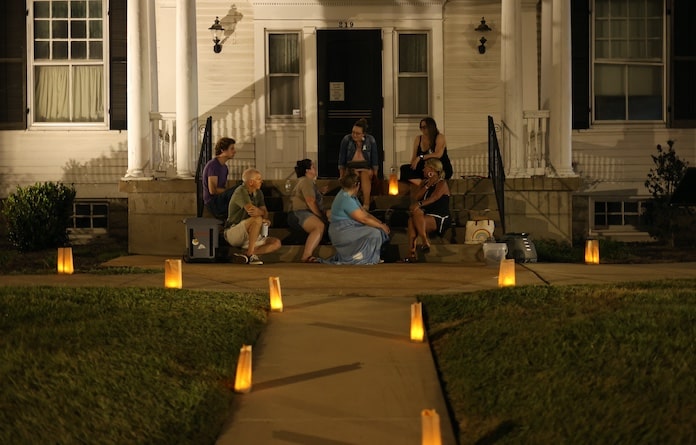Shining a light on drug addiction

Members of Waterloo Listens as well as other members of the community gathered Thursday to recognize International Overdose Awareness Day, discussing the hardships that come from substance abuse as well as efforts to help those suffering from the disease find recovery.
International Overdose Awareness Day is observed Aug. 31 each year. In the U.S., National Recovery Month is subsequently recognized through September.
Locally, Waterloo Listens began hosting events in recognition of the observance in 2022, with another gathering taking place last year as well.
Both of these events featured guest speakers to offer insight into substance abuse. Last year in particular featured a number of voices, including representatives from Monroe County EMS who discussed their experiences responding to overdose incidents.
This year’s event was somewhat less formal, with a small group gathering in front of the Col. Morrison Home on Park Street for a candlelight vigil.
The event was largely organized by Dawn Schulte with help from Amanda Schweigert. Schulte offered a brief statement at the top of the gathering to welcome everyone.
What followed was a lengthy conversation among attendees covering a variety of topics pertaining to substance abuse.
With the opioid epidemic an ever-growing concern thanks largely due to the availability of fentanyl, naloxone – specifically the nasal spray NARCAN – was mentioned a number of times.
The medication can be used to reverse a narcotic overdose, and it was broadly agreed by those in attendance that it is a good idea for just about anyone to have a dose in their vehicle or otherwise with them should they ever encounter someone in need of it.
It was also noted that those interested in picking up a dose of NARCAN can find them at Human Support Services and Morrison-Talbott Library.
Additionally, a mandate which went into effect at the start of this year requires schools throughout Illinois to keep a supply of an opioid antagonist should an overdose occur on school grounds.
Along with fentanyl and other opioids, alcohol addiction was a major point of discussion. Those in attendance spoke about how alcohol is so ubiquitous in society, with those uninterested in drinking or unable to handle their alcohol often being shamed or broadly excluded from so many social events which center around alcohol consumption.
A number of individuals present spoke generally about addiction and how difficult it can be to overcome the disease, with Schulte, who works with some clients struggling with addiction as a licensed clinical social worker, mentioning the concept of “emotional sobriety.”
“What we talk about is not only abstaining but preaching emotional sobriety which is when you can handle your issues without the use of a substance,” Schulte said. “It’s a whole different way of living your life, not having that to lean on, so there has to be a lot of support around it.”
Substance abuse among young people was also a big discussion item, with Schweigert, who works with the Harris House Foundation, speaking about how many of the organization’s clients have struggled with addiction for a long time, having started in their youth.
She voiced hopes that the stories these clients share has an impact among the younger clients.
“We have so many clients in their 40s, 50s and 60s that are like, ‘I’ve been going to treatment since my 20s. I wish I would have just listened to what people told me then. I wish I didn’t have to spend most of my life doing this,’” Schweigert said.
Kacie Woods, executive director for the Monroe County Coalition for Drug-Free Communities, was also present at the event to speak about substance abuse among young people.
She spoke about the coalition’s plans for Project Snowball, an effort involving leadership camps that are meant to provide students with an opportunity to educate themselves on substance abuse and lead the way in addressing the problem in their schools and communities.
“It’s like D.A.R.E. for bigger kids,” Woods said. “We’re looking at 6-12 grade alternative options. It’s all student driven. We’re here to facilitate and make sure they don’t make really poor choices, but other than that we want them to have the loudest voice. ‘What do you want to do? What do you want this to be? What do you see the problems in your school being?’”
It was noted that it can be much more impactful for a young person to hear about substance abuse from one of their peers.
“There are coalitions where the kids are being empowered to teach their peers in their own health classes in their schools how to use NARCAN,” Woods said. “Let’s empower them to do the teaching.”
Following the meeting, Schweigert spoke with the Republic-Times, offering advice for those hoping to help friends or family members struggling with addiction.
Education was her biggest piece of advice, as she encouraged individuals to familiarize themselves with signs of addiction.
“You can’t make somebody go to treatment, but if you have no idea what’s going on, then you’re not going to be able to address or solve the problem, either,” Schweigert said. “I think we can try to at least help people that are struggling with addiction come out of denial if we, the loved ones around them, are not in such denial about it.”
She pointed to the Substance Abuse and Mental Health Services Administration as well as the International Overdose Awareness Day site as strong resources for substance abuse education.






